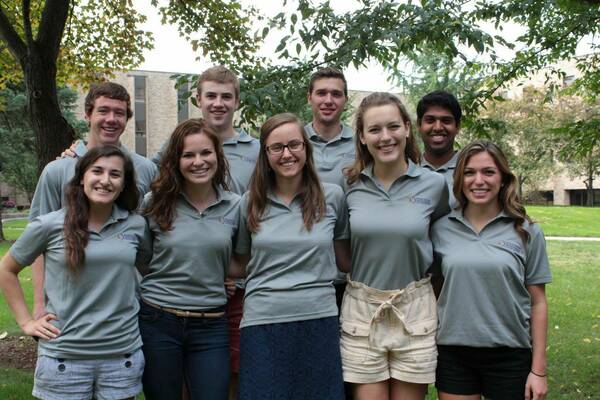
Every year, the LEO team eagerly welcomes a cohort of Notre Dame undergraduate students. For their part, LEO researchers are there to guide students as they delve into their passion for upholding human dignity. One of the hopes for LEO’s close relationship with Notre Dame is to inspire the next generation of the University’s leaders and thinkers to use economic research to move people out of poverty. The goal is to impart a deep appreciation for LEO’s mission, and a hands-on understanding of evidence-driven solutions.
Since our founding in 2012, we are excited to see previous members of our undergraduate program pursuing their own economic research projects.
Melanie Wallskog (ND ‘16), a past LEO undergraduate intern, is finishing her PhD in Economics and pursuing an academic career as a labor economist.
When Melanie entered Notre Dame as a freshman in the fall of 2012, she planned to major in theoretical math but her interest evolved toward economics. Melanie explains, “I quickly realized I wanted to study applied math--ideally in a capacity to help make people’s lives better.” In her sophomore year, she formally changed her major to Economics and entered her first position as a research assistant to two Notre Dame professors.
Through her work, Melanie began to imagine the possibility of a career as a research economist and between her sophomore and junior years, she was selected as a LEO research assistant. At the time, LEO was a small but devoted team including co-founders Jim and Bill, a few recent Notre Dame graduates, and Melanie’s cohort--one of the first of LEO’s summer undergraduate research assistants.
“Given LEO was very new, I did not have many expectations. That said, I was really happy with the experience and was lucky enough to be part of a project and learn how to write and publish an academic paper--great preparation for my PhD. It was fun--I worked alongside a great group of undergrads and recent graduates who formed a wonderful community.”
Melanie continued to work with LEO until she graduated and started her PhD. While working with Bill and Jim over the years, her studies revolved around how financial aid can be implemented to fight homelessness with LEO’s Homelessness Prevention Call Center (HPCC) project.
She expresseS the eye-opening aspects of her experience. “I used my applied math in exactly the way I had dreamed it could be used. That project--and LEO’s projects more broadly--informed policymakers and economists about an effective homelessness prevention program, allowing cities to justify important anti-poverty programs on a fiscal basis.” Her work highlighted how HPCC and similar programs can “tangibly make the world better by keeping people out of homelessness, and I believe we helped the fight against poverty by showing this efficacy in a scientifically robust way.”
Working at LEO changed the way Melanie saw domestic poverty in two important ways. “An incredible number of Americans live in varying degrees of poverty, and this poverty affects every part of their lives, from their ability to find and keep schooling, housing, and jobs to simply being able to put food on the table for their families.” And although, “policymakers may be aware of this problem, they frequently do not have scientific support for how best to combat poverty, leading to potentially inefficient programs and difficulty finding financial support for programs.”
Her time spent with LEO, even co-authoring a paper with Bill and Jim as an undergraduate, cemented her goal of getting a PhD in economics. “Co-authoring gave me real ownership of my work--I had a lot of autonomy in making analytic decisions, which both raised the stakes of my work and allowed me to produce meaningful work.” When presenting their paper to advisors of the Chicago mayor and other policymakers, she saw that her academic work could really change the world.
“My LEO work set a very high standard and I hope to continually push my work toward that standard,” she explains.
When she looks back on her LEO experience, one of the aspects for which she is most grateful is the people. “LEO gave me access to other undergraduate students interested in economic research, who I would not have necessarily met in my courses. I met one of my best friends, Grace McCormack, who is currently pursuing a PhD at the Harvard Kennedy School. Alongside Grace and my other colleagues, I got my first taste of being part of a research community, which made the experience both more enjoyable and engaging.”
For both Melanie and other LEO alums now pursuing a PhD in Economics and other fields, the undergrad experience can be a vital step in picturing their future in the field of economic research, and other fields, alike. As she puts it, “LEO has really changed the game for evaluating domestic poverty programs, in a way that I hope will not only help fight poverty but also convince policymakers and philanthropists that they can fight poverty in an effective way.”